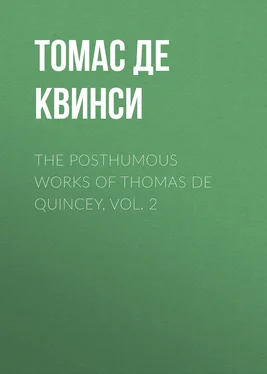Томас Де Квинси - The Posthumous Works of Thomas De Quincey, Vol. 2
Здесь есть возможность читать онлайн «Томас Де Квинси - The Posthumous Works of Thomas De Quincey, Vol. 2» — ознакомительный отрывок электронной книги совершенно бесплатно, а после прочтения отрывка купить полную версию. В некоторых случаях можно слушать аудио, скачать через торрент в формате fb2 и присутствует краткое содержание. Жанр: foreign_prose, literature_19, foreign_antique, на английском языке. Описание произведения, (предисловие) а так же отзывы посетителей доступны на портале библиотеки ЛибКат.
- Название:The Posthumous Works of Thomas De Quincey, Vol. 2
- Автор:
- Жанр:
- Год:неизвестен
- ISBN:нет данных
- Рейтинг книги:3 / 5. Голосов: 1
-
Избранное:Добавить в избранное
- Отзывы:
-
Ваша оценка:
- 60
- 1
- 2
- 3
- 4
- 5
The Posthumous Works of Thomas De Quincey, Vol. 2: краткое содержание, описание и аннотация
Предлагаем к чтению аннотацию, описание, краткое содержание или предисловие (зависит от того, что написал сам автор книги «The Posthumous Works of Thomas De Quincey, Vol. 2»). Если вы не нашли необходимую информацию о книге — напишите в комментариях, мы постараемся отыскать её.
The Posthumous Works of Thomas De Quincey, Vol. 2 — читать онлайн ознакомительный отрывок
Ниже представлен текст книги, разбитый по страницам. Система сохранения места последней прочитанной страницы, позволяет с удобством читать онлайн бесплатно книгу «The Posthumous Works of Thomas De Quincey, Vol. 2», без необходимости каждый раз заново искать на чём Вы остановились. Поставьте закладку, и сможете в любой момент перейти на страницу, на которой закончили чтение.
Интервал:
Закладка:
Now, in studying history, the difficulty is about the delicacy of the lock, and the mode of applying the key. We doubt not that many readers will view all this as false refinement. But hardly, if they had much considered the real experimental cases in history. For instance, suppose the condition of a people known as respects (1) civilization, as respects (2) relation to the sovereign, (3) the prevailing mode of its industry, (4) its special circumstances as to taxation, (5) its physical conformation and temperament, (6) its local circumstances as to neighbours warlike or not warlike, (7) the quality and depth of its religion, (8) the framework of its jurisprudence, (9) the machinery by which these laws are made to act, (10) the proportion of its towns to its rural labour, and the particular action of its police; these and many other items, elements, or secondary features of a people being known, it yet remains unknown which of these leads, which is inert, and of those which are not inert in what order they arrange their action. The principium movendi , the central force which organizes and assigns its place in the system to all the other forces, these are quite undetermined by any mere arithmetical recitation of the agencies concerned. Often these primary principles can be deduced only tentatively, or by a regress to the steps, historically speaking, through which they have arisen. Sometimes, for instance, the population, as to its principle of expansion, and as to its rate, together with the particular influence socially of the female sex, exercises the most prodigious influence on the fortunes of a nation, and its movement backwards or forwards. Sometimes again as in Greece (from the oriental seclusion of women) these causes limit their own action, until they become little more than names.
In such a case it is essential that the leading outlines at least should be definite; that the coast line and the capes and bays should be well-marked and clear, whatever may become of the inland waters, and the separate heights in a continuous chain of mountains.
But we are not always sure that we understand Mr. Finlay, even in the particular use which he makes of the words 'Greece' and 'Grecian.' Sometimes he means beyond a doubt the people of Hellas and the Ægean islands, as opposed to the mixed population of Constantinople. Sometimes he means the Grecian element as opposed to the Roman element in the composition of this mixed Byzantine population. In this case the Greek does not mean (as in the former case) the non-Byzantine, but the Byzantine. Sometimes he means by preference that vast and most diffusive race which throughout Asia Minor, Syria, Egypt, the Euxine and the Euphrates, represented the Græco-Macedonian blood from the time of Alexander downwards. But why should we limit the case to an origin from this great Alexandrian æra? Then doubtless (330 b.c.) it received a prodigious expansion. But already, in the time of Herodotus (450 b.c.), this Grecian race had begun to sow itself broadcast over Asia and Africa. The region called Cyrenaica (viz., the first region which you would traverse in passing from the banks of the Nile and the Pyramids to Carthage and to Mount Atlas, i.e. , Tunis, Algiers, Fez and Morocco, or what we now call the Barbary States) had been occupied by Grecians nearly seven hundred years before Christ. In the time of Crœsus (say 560 b.c.) it is clear that Grecians were swarming over Lydia and the whole accessible part of Asia Minor. In the time of Cyrus the younger (say 404 b.c.) his Grecian allies found their fiercest opponents in Grecian soldiers of Artaxerxes. In the time of Alexander, just a septuagint of years from the epoch of this unfortunate Cyrus, the most considerable troops of Darius were Greeks. The truth is, that, though Greece was at no time very populous, the prosperity of so many little republics led to as ample a redundancy of Grecian population as was compatible with Grecian habits of life; for, deceive not yourself, the harem
Конец ознакомительного фрагмента.
Текст предоставлен ООО «ЛитРес».
Прочитайте эту книгу целиком, купив полную легальную версию на ЛитРес.
Безопасно оплатить книгу можно банковской картой Visa, MasterCard, Maestro, со счета мобильного телефона, с платежного терминала, в салоне МТС или Связной, через PayPal, WebMoney, Яндекс.Деньги, QIWI Кошелек, бонусными картами или другим удобным Вам способом.
1
Really now I can't say that. No; I couldn't have stood Cruger's arguments. 'Ditto to Mr. Burke' is certainly not a very brilliant observation, but still it's supportable, whereas I must have found the pains of contradiction insupportable.
2
This sublimest of all Greek poets did really die, as some biographers allege, by so extraordinary and, as one may say, so insulting a mistake on the part of an eagle.
3
Frankistan. —There is no word, but perhaps Frankistan might come nearest to such a word, for expressing the territory of Christendom taken jointly with that of those Mahometan nations which have for a long period been connected with Christians in their hostilities, whether of arms or of policy. The Arabs and the Moors belong to these nations, for the circle of their political system has always been made up in part by a segment from Christendom, their relations of war being still more involved with such a segment.
4
'Merry Wives of Windsor,' Act I., Sc. 4. Mrs. Quickly: '… An honest, willing, kind fellow, as ever servant shall come in house withal; and I warrant you no tell-tale, nor no breed-hate; his worst fault is, that he is given to prayer; he is something peevish that way; but nobody but has his fault—but let that pass.'—Ed.
5
' Pun them into shivers ': Troilus and Cressida, Act II., Sc. 1. We refer specially to the jolly boatswain, having already noticed the fact, that sailors as a class, from retaining more of the simplicity and quick susceptibility belonging to childhood, are unusually fond of waxen exhibitions. Too much worldly experience indisposes men to the playfulness and to the toyfulness (if we may invent that word) of childhood, not less through the ungenial churlishness which it gradually deposits, than through the expansion of understanding which it promotes.
6
' Science not always fathomable. ' Several distinguished Frenchmen have pursued a course of investigations into these fenestral phenomena, which one might call the Fata Morgana of Frost ; and, amongst these investigators, some—not content with watching, observing, recording—have experimented on these floral prolusions of nature by arranging beforehand the circumstances and conditions into which and under which the Frost Fairy should be allowed to play. But what was the result? Did they catch the Fairy? Did they chase her into her secret cells and workshops? Did they throw over the freedom of her motions a harness of net-work of coercion as the Pagans over their pitiful Proteus? So far from it, that the more they studied the less they understood; and all the traps which they laid for the Fairy, did but multiply her evasions.
7
The passage occurs at p. 354, vol. ii. of the Lectures ; and we now find, on looking to the place, that the illustration is drawn from 'a dell of lazy Sicily.' The same remark has virtually been anticipated at p. 181 of the same volume in the rule about 'converting mere abstractions into persons.'
Читать дальшеИнтервал:
Закладка:
Похожие книги на «The Posthumous Works of Thomas De Quincey, Vol. 2»
Представляем Вашему вниманию похожие книги на «The Posthumous Works of Thomas De Quincey, Vol. 2» списком для выбора. Мы отобрали схожую по названию и смыслу литературу в надежде предоставить читателям больше вариантов отыскать новые, интересные, ещё непрочитанные произведения.
Обсуждение, отзывы о книге «The Posthumous Works of Thomas De Quincey, Vol. 2» и просто собственные мнения читателей. Оставьте ваши комментарии, напишите, что Вы думаете о произведении, его смысле или главных героях. Укажите что конкретно понравилось, а что нет, и почему Вы так считаете.











